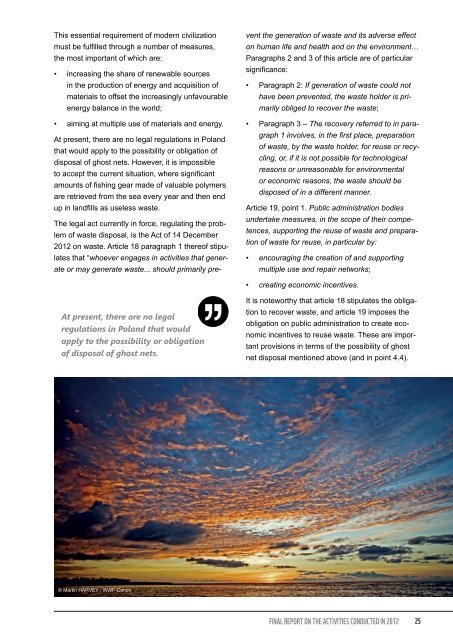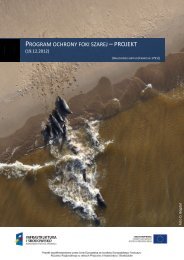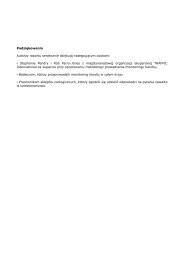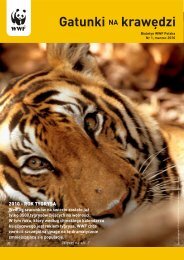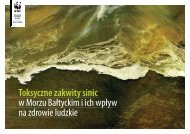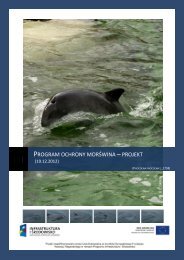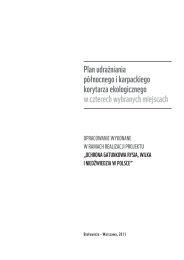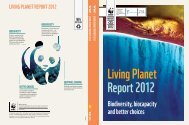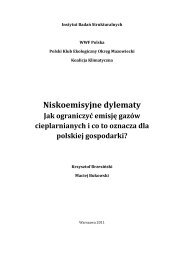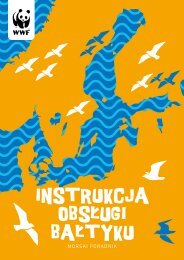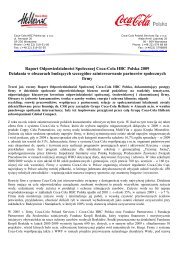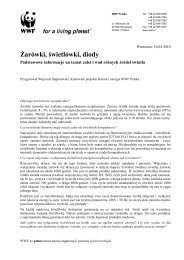COLLECTING GHOST NETS IN THE BALTIC SEA - WWF
COLLECTING GHOST NETS IN THE BALTIC SEA - WWF
COLLECTING GHOST NETS IN THE BALTIC SEA - WWF
You also want an ePaper? Increase the reach of your titles
YUMPU automatically turns print PDFs into web optimized ePapers that Google loves.
This essential requirement of modern civilization<br />
must be fulfilled through a number of measures,<br />
the most important of which are:<br />
• increasing the share of renewable sources<br />
in the production of energy and acquisition of<br />
materials to offset the increasingly unfavourable<br />
energy balance in the world;<br />
• aiming at multiple use of materials and energy.<br />
At present, there are no legal regulations in Poland<br />
that would apply to the possibility or obligation of<br />
disposal of ghost nets. However, it is impossible<br />
to accept the current situation, where significant<br />
amounts of fishing gear made of valuable polymers<br />
are retrieved from the sea every year and then end<br />
up in landfills as useless waste.<br />
The legal act currently in force, regulating the problem<br />
of waste disposal, is the Act of 14 December<br />
2012 on waste. Article 18 paragraph 1 thereof stipulates<br />
that “whoever engages in activities that generate<br />
or may generate waste... should primarily prevent<br />
the generation of waste and its adverse effect<br />
on human life and health and on the environment…<br />
Paragraphs 2 and 3 of this article are of particular<br />
significance:<br />
• Paragraph 2: If generation of waste could not<br />
have been prevented, the waste holder is primarily<br />
obliged to recover the waste;<br />
• Paragraph 3 – The recovery referred to in paragraph<br />
1 involves, in the first place, preparation<br />
of waste, by the waste holder, for reuse or recycling,<br />
or, if it is not possible for technological<br />
reasons or unreasonable for environmental<br />
or economic reasons, the waste should be<br />
disposed of in a different manner.<br />
Article 19, point 1. Public administration bodies<br />
undertake measures, in the scope of their competences,<br />
supporting the reuse of waste and preparation<br />
of waste for reuse, in particular by:<br />
• encouraging the creation of and supporting<br />
multiple use and repair networks;<br />
• creating economic incentives.<br />
At present, there are no legal<br />
regulations in Poland that would<br />
apply to the possibility or obligation<br />
of disposal of ghost nets.<br />
It is noteworthy that article 18 stipulates the obligation<br />
to recover waste, and article 19 imposes the<br />
obligation on public administration to create economic<br />
incentives to reuse waste. These are important<br />
provisions in terms of the possibility of ghost<br />
net disposal mentioned above (and in point 4.4).<br />
© Martin HARVEY / <strong>WWF</strong>-Canon<br />
F<strong>IN</strong>AL REPORT ON <strong>THE</strong> ACTIVITIES CONDUCTED <strong>IN</strong> 2012<br />
25


